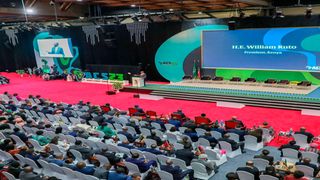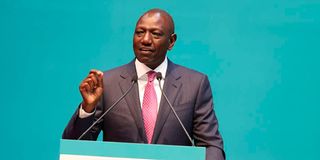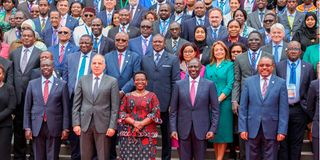
President William Ruto speaks at KICC, Nairobi on Monday, September 4, 2023 during the during the Africa Climate Summit 2023.
| Dennis Onsongo | Nation Media GroupClimate Summit: Africa poised to make bold statement with its Nairobi Declaration
About three decades ago, world leaders, guided by scientists, noticed that greenhouse gas emissions, which contribute to global warming, were gradually increasing, but there was no global legal framework to act as a compass to limit the increase.
In response, more than 190 countries agreed to create and become parties to the United Nations Framework Convention on Climate Change (UNFCCC).
The body was created alongside two other institutions to help protect the world's biodiversity and combat desertification.
All African countries are parties to the UNFCCC and have always attended the annual Climate Conference of Parties.
However, 30 years later, Africa has never had a regional meeting to discuss its concerns.
Time and again, the continent has been at the back of ideas from the global North, whose agenda at climate summits is backed by a unified voice and strong statements.
While Africa has its regional groups at the UNFCCC, such as the African Group of Negotiators (AGN) and the Group of 77 (G-77), it has acted like a whining child that rarely gets a seat at the big boys' table.
This is despite the fact that the continent contributes about 4 per cent of total greenhouse gas emissions, yet its grievances are either sidelined or given a false assurance in the form of promises that are mostly not kept.
One tired pledge, and an example of a futile promise that every African climate negotiator knows by rote, is the $100 billion pledge made in 2009 by countries of the global North to help finance developing countries each year.
This was to be achieved by 2020, with a further extension to 2025, but it remains glossy on paper and a pipe dream in reality.

President William Ruto address delegates during the opening of the Africa Climate Summit at Kenyatta International Convention Centre, Nairobi, on Monday, September 4, 2023.
Last year, which was an opportune time for Africa to shine as it hosted the 27th Conference of Parties (COP27), Parties agreed on a historic Loss and Damage Facility, the details of which, especially who pays whom and by when, are still unclear.
In Kenya's context, based on the country's recent climate crises, Loss and Damage could be the loss suffered by people in the North Eastern region when drought ravaged them for more than three years, and those in Baringo whose land, lives and livelihoods were lost to a climate-induced risen lake that forced them from their homes.
That is why Africa awoke its sleeping giant and on Monday September 4 made a historic roar at the big boys' table, hoping that its unified voice will leave an indelible mark that will drive climate action.
The inaugural climate summit unfolded at the iconic Kenyatta International Convention Centre (KICC), with Kenya's President William Ruto boldly leading the African delegation by declaring that the continent holds the power to decarbonise the world.
It is this power that will produce the Nairobi Declaration, the expected outcome of the summit, and set the stage for the 28th Conference of Parties later this year.
He said the three-day summit should be a springboard for Africa to decarbonise the globe and boost investment for the continent.
Decarbonisation means that countries find a way to eliminate or reduce the main gas that contributes to global warming, carbon dioxide.

Delegates follow proceedings during the Africa Climate Summit.
“We are brought together with a clear understanding of the inadequacy of our needs in regards to climate finance but we will not shy away from realities that must achieve positive change,” he said.
“Climate change is not just an abstract composition, it has been proven by science and emerging experience. This is why we are not here to catalogue grievances and list problems. We are here to talk about solutions,” he added.
On decarbonising the world, President Ruto said Africa's renewable energy potential will not only benefit the continent but also bring in development funds.
“Our assets need to be in the form of partnerships. The reason why we have not made so much progress is because Africa had not consolidated and brought her ideas to the table. The day we do that, then we will be a wealthy continent,” he said.

President William Ruto takes a group photo with delegates at KICC, Nairobi on Monday, September 4, 2023 during the during the Africa Climate Summit 2023.
“It is not just the volume of our renewable resources that stand out, but also its non-seasonality. We will always have the sun out,” said Dr Ruto.
Dr Ruto subtly called out Africa's lenders for their inequity in paying loans, aligning with one of the key agendas for the summit which is to restructure news ways of paying debts as their distress derails the continent from development as it is highly vulnerable to the effects of climate change.
"It is no secret that we pay at least five times more on our loans than the advanced economies. I see this as an opportunity to unleash the creativity of local investment. My call to everyone at this summit is to have Africa's priorities. It is a moment to imagine a bold and radically positive African future," he said.
“The future is not something to hope for, or wish for, it is for us to actualize and conceptualise now. This is what we have come to do at the Africa Climate Summit,” he added.
Other high-level delegates at the event backed the African agenda, despite an uproar weeks before the event from non-state actors who said outsiders had hijacked the summit with their ideas.

From left: Deputy President Rigathi Gachagua, President William Ruto and former Ethiopian Prime Minister Hailemariam Desalegn Boshe in attendance during the opening ceremony of the Africa Climate Summit.
They had raised alarm over the involvement of US consultancy McKinsey & Company in the Africa Climate Summit.
Cabinet Secretary for the Environment, Soipan Tuya, assured a previous press conference that Africa's business would remain Africa's business, but she said partners from outside the continent would be welcome at the summit.
On Monday, she reiterated that the overall goal of the summit is to charter a green growth path for the African continent.
"Climate change has entered a new era, it is not just about an environmental or development angle, it is now about climate change in the context of climate justice," she said.
Representing civil society, Mithika Mwenda, executive director of the Pan African Climate Justice Alliance (PACJA), said it was time for climate summits to move away from being a fight between the global North and the global South.
He warned that industrialised countries should not use such summits to evade responsibility for their high emissions.
"The outcome of this summit should not only provide solutions for people whose livelihoods have been affected by climate change and its false solutions, but also reflect African realities, and adaptation should be at the heart of it," he said.
Josefa Sacko, Commissioner for Agriculture, Rural Development, Blue Economy and Sustainable Environment at the African Union Commission, said climate change is a pandemic in Africa."What we are witnessing is a situation where governments are abandoning development and spending their money on the climate crisis. Africa needs to move from a donor-recipient relationship to building investments," she said.

President William Ruto arrives for opening of the inaugural Africa Climate Summit in an electric clean energy-powered car at Kenyatta International Convention Centre, Nairobi, on Monday September 4, 2023.
Youth and indigenous peoples were represented and shared the need for their voices to be at the centre of the climate talks.
"Our declaration reflects the commitment to the power of youth, we seek to increase youth participation and inclusion in climate governance. We urge you, our esteemed leaders, to join us on this journey.
Speaking on behalf of indigenous people in Africa, Anne Semante said the role of indigenous people should not be overlooked and that despite being the most vulnerable, they receive only 1 per cent of climate finance."We lack policy frameworks that limit our direct access to climate finance. We call for the establishment of an Indigenous Resilience Fund," she said.
UNFCCC Executive Secretary Simon Stiell said the summit was important for Africa to join hands on how to build resilience, transform economies and make a just transition.





